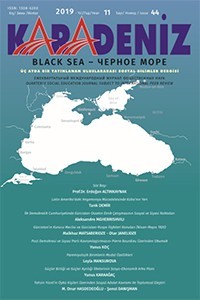PEDAGOJİK FORMASYON EĞİTİMİ ALAN ÜNİVERSİTE ÖĞRENCİLERİNİN BİLİMSEL ARAŞTIRMANIN BASAMAKLARINA YÖNELİK ÖZ YETERLİLİKLERİNİN İNCELENMESİ
THE EXAMINATION OF SELF-EFFICACY OF UNIVERSITY STUDENTS THAT TAKE PEDAGOGICAL FORMATION TRAINING TOWARDS SCIENTIFIC RESEARCH STEPS
Author(s): Alptürk AkçöltekinSubject(s): Higher Education , Methodology and research technology
Published by: Kültür Ajans Tanıtım ve Organizasyon
Keywords: Pedagogical Formation; Scientific Research; Self-Efficacy; Reporting; Data Analysis; Method; Hypothesis; Problem Identification;
Summary/Abstract: The aim of this study is to determine the self-efficacy of university students that take pedagogical formation training towards scientific research steps. Accordingly, the scientific research self-efficacy scale was used which consists of 6 factors and 37 items. The study group consists of 250 4th grade students that take pedagogical formation training in a state university. According to the results of the study, it was concluded that students possessed a high level of self-efficacy in presenting study findings by discussing, however, they possessed a low level of self-efficacy in terms of approaching the research as a whole and presenting the reporting process accordingly in relation to the reporting of scientific research dimension, students possessed a high level of self-efficacy in appropriate data analysis techniques that would test the hypothesis/hypotheses, however, they possessed a low level of self-efficacy in terms of testing the assumptions of statistical techniques that they would use in relation to data analysis dimension, they possessed a high level of self-efficacy in examining the literature within the context of problem status, however, they possessed a low level of self-efficacy in terms of using the national and international databases in relation to literature survey dimension, they possessed a high level of self-efficacy in performing validity and reliability studies of data collection tools that they would use in research, however, they possessed a low level of self-efficacy in determining the suitable method that they can test the hypotheses in relation to method dimension, they possessed a high level of self-efficacy in purifying the hypothesis/hypotheses from value judgments and general judgments, however, they possessed a low level of self-efficacy in terms of their hypothesis/hypotheses being open to assumption, experiment, and observations, and finally, students possessed a high level of self-efficacy in determining the problem statement by considering the priorities and needs of the society, however, they possessed a low level of self-efficacy in terms of defining the problem statements as individual in relation to the problem identification dimension.
Journal: Karadeniz Uluslararası Bilimsel Dergi
- Issue Year: 2019
- Issue No: 44
- Page Range: 290-301
- Page Count: 12
- Language: Turkish

